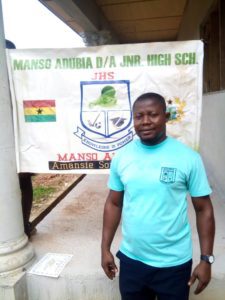Claire Bolton, one of CODE’s Program Managers interviewed teacher Seth Amissah, who has participated in our Reading Ghana program. We have kept it in question and answer format and have shortened some of the responses.
Q: Tell us a little about your student population and teachers.
A: “The school is in Manso Adubia the district capital of Amansie South. Most people in the community make a living from mining and farming. There are a few people employed by the government (nurses, police, teachers etc.). I estimate 85% of the community is illiterate and only 15% have an education beyond senior high school. 83 students are enrolled in the 2019 – 2020 academic year. JH3 students returned to school and have completed their final exams. JH2 students (14 girls and 8 boys) are now back in the classroom to complete their 2019-20 academic year. My staff consists of eight teachers (four female and four male). It’s an unusual occurrence to have gender balance like this. All teachers on staff have a teaching certificate, but only three have a BA degree. There’s no physical library at the school. Construction is underway of a building for additional classrooms with space for a library and computer lab.”
 Q: How many years have you been teaching and what are your qualifications?
Q: How many years have you been teaching and what are your qualifications?
A: “I’ve been teaching for 15 years. I joined Adubia D/A Junior High School in October 2018 as a headteacher. I have an ‘A’ Certificate from Enchi Training College now known as University College of Education from 2005. I have a diploma in basic education from the University of Cape Coast in 2009 and a Bachelor of Education degree from University of Education Winneba in 2015.”
Q: What attracted you to the teaching profession?
A: “Illiteracy is a big challenge for my community, and I tell my students that they should not expect to be able to work in the mining fields all the days of their life. There will come a time when they will not be physically able to do that kind of work, so getting an education is the best way for them to provide for themselves and their families in the long term. There’s a big part of me that desires to change the culture of caning students. As a child, I was caned which made me dislike school. Teachers don’t have to resort to caning to get students to learn. That only creates fear. Students can learn if teachers take into consideration their social, emotional, and physical needs. For example, instead of assuming that a student is unwilling to participate because they are being disrespectful, a teacher can take the time to know the student and find creative ways to encourage their participation. I’m a native of this community, and desire to be a role model to the youth. I attended a lower ranking school but persevered to attain higher education and have returned to Manso Adubia as way of giving back to my community. There’s another teacher on my staff who has done the same – going to pursue higher education and returning Adubia to teach. I am driven by the possibility of my students’ success. I want my students to focus on the possibility of success.”
Q: What do you find most challenging about being an effective teacher?
A: “Access to learning materials is a challenge. Provisions from the government are slow to come or don’t come. We rely on making photocopies which is costly. Students entering JH1 are at a very low reading level. Instead of coming to school young people engage in ‘galamsey’ (informal mining operations) where they get paid $4-5 per day. Some parents don’t encourage their kids to go to school. My teachers make an effort to go to the students’ homes to encourage them to go to school.”
Q: The new English curriculum puts an emphasis on addressing gender inequality in the classroom, why do you think this is important?
A: “Gender equality is essential. Back in the day, there was a saying, ‘when you send a girl to school it is a waste of education’. But I tell my students, look around some of our ministers are female, and in Liberia, they had a female president. I encourage female students to run for prefect (student authorized to enforce discipline), and for boys to vote for a female prefect. It is important for teachers to understand the different emotional and physical needs of the girl child. For example, teachers need to be sensitive to the needs of a female student when they are menstruating. Some girls miss school when they are on their menstrual cycle because they feel ashamed. Teachers need to be sensitive about these issues understand how that could affect their performance in school.”
Q: How has COVID-19 pandemic impacted teaching and learning at your school?
“It has decreased enrollment in JH3 and JH2, the two classes that have been allowed to return to school to complete their 2019-20 academic year. Parents fear their children will get infected with COVID. My teachers and I have been visiting students at home to encourage them to enroll in school when the new academic year begins in January. We are assuring parents that schools have put in place the necessary protocols to keep their children safe. We’ve been provided with water buckets, soap, tissues, sanitizers, and each student will receive three reusable masks. During this time of COVID, female teachers with children of primary school age and younger are bringing their children with them to work because of school closures.”


